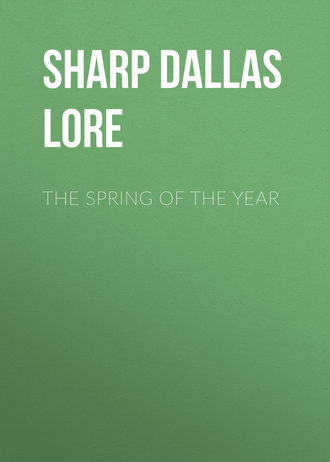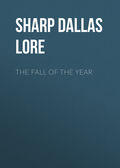
Sharp Dallas Lore
The Spring of the Year
CHAPTER XII
AN ACCOUNT WITH NATURE
There were chipmunks everywhere. The stone walls squeaked with them. At every turn, from early spring to early autumn, a chipmunk was scurrying away from me. Chipmunks were common. They did no particular harm, no particular good; they did nothing in particular, being only chipmunks and common, or so I thought, until one morning (it was June-bug time) when I stopped and watched a chipmunk that sat atop the stone wall down in the orchard. He was eating, and the shells of his meal lay in a little pile upon the big flat stone which served as his table.
They were acorn-shells, I thought; yet June seemed rather late in the season for acorns, and, looking closer, I discovered that the pile was entirely composed of June-bug shells – wings and hollow bodies of the pestiferous beetles!
Well, well! I had never seen this before, never even heard of it. Chipmunk, a useful member of society! actually eating bugs in this bug-ridden world of mine! This was interesting and important. Why, I had really never known Chipmunk, after all!
So I hadn’t. He had always been too common. Flying squirrels were more worth while, because there were none on the farm. Now, however, I determined to cultivate the acquaintance of Chipmunk, for there might be other discoveries awaiting me. And there were.
A narrow strip of grass separated the orchard and my garden-patch. It was on my way to the garden that I most often stopped to watch this chipmunk, or rather the pair of them, in the orchard wall. June advanced, the beetles disappeared, and the two chipmunks in the wall were now seven, the young ones almost as large as their parents, and both young and old on the best of terms with me.
For the first time in four years there were prospects of good strawberries. Most of my small patch was given over to a new variety, one that I had originated; and I was waiting with an eagerness which was almost anxiety for the earliest berries.
I had put a little stick beside each of the three big berries that were reddening first (though I could have walked from the house blindfolded and picked them). I might have had the biggest of the three on June 7th, but for the sake of the flavor I thought it best to wait another day. On the 8th I went down to get it. The big berry was gone, and so was one of the others, while only half of the third was left on the vine!
Gardening has its disappointments, its seasons of despair – and wrath, too. Had a toad showed himself at that moment, he might have fared badly, for more than likely, I thought, it was he who had stolen my berries. On the garden wall sat a friendly chipmunk eying me sympathetically.
A few days later several fine berries were ripe, and I was again on my way to the garden when I passed the chipmunks in the orchard. A shining red spot among the vine-covered stones of their wall brought me to a stop. For an instant I thought that it was my rose-breasted grosbeak, and that I was about to get a clew to its nest. Then up to the slab where he ate the June-bugs scrambled the chipmunk, and the rose-red spot on the breast of the supposed grosbeak dissolved into a big scarlet-red strawberry. And by its long wedge shape I knew it was one of my new variety.
I hurried across to the patch and found every berry gone, while a line of bloody fragments led me back to the orchard wall, where a half-dozen fresh calyx crowns completed my second discovery.
No, it did not complete it. It took a little watching to find out that the whole family – all seven! – were after those berries. They were picking them half ripe, even, and actually storing them away, canning them, down in the cavernous depths of the stone-pile!
Alarmed? Yes, and I was wrathful, too. The taste for strawberries is innate, original; you can’t be human without it. But joy in chipmunks is a cultivated liking. What chance in such a circumstance has the nature-lover with the human man? What shadow of doubt as to his choice between the chipmunks and the strawberries?
I had no gun and no time to go over to my neighbor’s to borrow his. So I stationed myself near by with a fistful of stones, and waited for the thieves to show themselves. I came so near to hitting one of them with a stone that the sweat started all over me. After that there was no danger. I had lost my nerve. The little scamps knew that war had been declared, and they hid and dodged and sighted me so far off that even with a gun I should have been all summer killing the seven of them.
Meantime, a good rain and the warm June days were turning the berries red by the quart. They had more than caught up to the chipmunks. I dropped my stones and picked. The chipmunks picked, too; so did the toads and the robins. Everybody picked. It was free for all. We picked them and ate them, jammed them, and canned them. I almost carried some over to my neighbor, but took peas instead.
The strawberry season closed on the Fourth of July; and our taste was not dimmed, nor our natural love for strawberries abated; but all four of the small boys had hives from over-indulgence, so bountifully did Nature provide, so many did the seven chipmunks leave us!
Peace between me and the chipmunks had been signed before the strawberry season closed, and the pact still holds. Other things have occurred since to threaten it, however. Among them, an article in a recent number of an out-of-door magazine, of wide circulation. Herein the chipmunk family was most roundly rated, in fact condemned to annihilation because of its wicked taste for birds’ eggs and for the young birds. Numerous photographs accompanied the article, showing the red squirrel with eggs in his mouth, but no such proof (even the red squirrel photographs, I strongly believe, were done from a stuffed squirrel) of Chipmunk’s guilt, though he was counted equally bad and, doubtless, will suffer with Chickaree at the hands of those who have taken the article seriously.
I believe that would be a great mistake. Indeed, I believe the article a deliberate falsehood, concocted in order to sell the made-up photographs. Chipmunk is not an egg-sucker, else I should have found it out. But of course that does not mean that no one else has found it out. It does mean, however, that if Chipmunk robs at all he does it so seldom as to call for no alarm or retribution.
There is scarcely a day in the nesting-season when I fail to see half a dozen chipmunks about the walls, yet I have never noticed one even suspiciously near a bird’s nest. In an apple tree, scarcely six jumps from the home of the family in the orchard wall, a brood of tree swallows came to wing this spring; while robins, chippies, and red-eyed vireos – not to mention a cowbird, which I wish they had devoured – have also hatched and flown away from nests that these squirrels might easily have rifled.
It is not often that one comes upon even the red squirrel in the very act of robbing a nest. But the black snake, the glittering fiend! and the dear house cats! If I run across a dozen black snakes in the early summer, it is safe to say that six of them are discovered to me by the cries of the birds that they are robbing. So is it with the cats. No creature larger than a June-bug, however, is often distressed by a chipmunk. In a recent letter to me Mr. Burroughs says: —
“No, I never knew the chipmunk to suck or destroy eggs of any kind, and I have never heard of any well-authenticated instance of his doing so. The red squirrel is the sinner in this respect, and probably the gray squirrel also.”
It will be difficult to find a true bill against him. Were the evidence all in, I believe that instead of a culprit we should find Chipmunk a useful citizen. Does not that pile of June-bug bodies on the flat stone leave me still in debt to him? He may err occasionally, and may, on occasion, make a nuisance of himself – but so do my four small boys, bless them! And, well, – who doesn’t? When a family of chipmunks, which you have fed all summer on the veranda, take up their winter quarters inside the closed cabin, and chew up your quilts, hammocks, table-cloths, and whatever else there is of chewable properties, then they are anathema.
The havoc certain chipmunks in the mountains once made among our possessions was dreadful. But instead of exterminating them root and branch, a big box was prepared the next summer and lined with tin, in which the linen was successfully wintered.
But how real was the loss, after all? Here was a rough log cabin on the side of Thorn Mountain. What sort of table-cloth ought to be found in such a cabin, if not one that has been artistically chewed by chipmunks? Is it for fine linen that we take to the woods in summer? The chipmunks are well worth a table-cloth now and then – well worth, besides these, all the strawberries and all the oats they can steal from my small patch.
Only it isn’t stealing. Since I ceased throwing stones and began to watch the chipmunks carefully, I do not find that their manner is in the least the manner of thieves. They do not act as if they were taking what they have no right to. For who has told Chipmunk to earn his oats in the sweat of his brow? No one. Instead, he seems to understand that he is one of the innumerable factors ordained to make me sweat – a good and wholesome experience for me so long as I get the necessary oats.
And I get them, in spite of the chipmunks, though I don’t like to guess at the quantity of oats they have carried off – anywhere, I should say, from a peck to a bushel, which they have stored as they tried to store the berries, somewhere in the big recesses of the stone wall.
All this, however, is beside the point. It isn’t a case of oats and berries against June-bugs. You don’t haggle with Nature after that fashion. The farm is not a market-place where you get exactly what you pay for. You must spend on the farm all you have of time and strength and brains; but you must not expect in return merely your money’s worth. Infinitely more than that, and oftentimes less. Farming is like virtue, – its own reward. It pays the man who loves it, no matter how short the crop of oats and corn.
So it is with Chipmunk. Perhaps his books don’t balance – a few June-bugs short on the credit side. What then? It isn’t mere bugs and berries, as I have just suggested, but stone-piles. What is the difference in value to me between a stone-pile with a chipmunk in it and one without. Just the difference, relatively speaking, between the house with my four boys in it, and the house without.
Chipmunk, with his sleek, round form, his rich color and his stripes, is the daintiest, most beautiful of all our squirrels. He is one of the friendliest of my tenants, too, friendlier even than the friendliest of my birds – Chickadee. The two are very much alike in spirit; but however tame and confiding Chickadee may become, he is still a bird and belongs to a different and, despite his wings, lower order of beings. Chickadee is often curious about me; he can be coaxed to eat from my hand. Chipmunk is more than curious; he is interested; and it is not crumbs that he wants, but friendship. He can be coaxed to eat from my lips, sleep in my pocket, and even come to be stroked.
I have sometimes seen Chickadee in winter when he seemed to come to me out of very need for living companionship. But in the flood-tide of summer life Chipmunk will watch me from his stone-pile and tag me along with every show of friendship.
The family in the orchard wall have grown very familiar. They flatter me. One or another of them, sitting upon the high flat slab, sees me coming. He sits on the very edge of the crack, to be truthful; and if I take a single step aside toward him, he flips, and all there is left of him is a little angry squeak from the depths of the stones. If, however, I pass properly along, do not stop or make any sudden motion, he sees me past, then usually follows me, especially if I get well off and pause.
During a shower one day I halted under a large hickory just beyond his den. He came running after me, so interested that he forgot to look to his footing, and just opposite me slipped and bumped his nose hard against a stone – so hard that he sat up immediately and vigorously rubbed it. Another time he followed me across to the garden and on until he came to the barbed-wire fence along the meadow. Here he climbed a post and continued after me by way of the middle strand of the wire, wriggling, twisting, even grabbing the barbs, in his efforts to maintain his balance. He got midway between the posts, when the sagging strand tripped him and he fell with a splash into a shallow pool below. No, he did not drown, but his curiosity did get a ducking.
Did the family in the orchard wall stay together as a family for the first summer? I should like to know. As late as August they all seemed to be in the wall; for in August I cut my oats, and during this harvest we all worked together.
I mowed the oats as soon as they began to yellow, cocking them to cure for hay. It was necessary to let them “make” for six or seven days, and all this time the chipmunks raced back and forth between the cocks and the stone wall. They might have hidden their gleanings in a dozen crannies nearer at hand; but evidently they had a particular storehouse, near the home nest, where the family could get at their provisions in bad weather without coming forth.
Had I removed the stones and dug out the nest, I should have found a tunnel leading into the ground for a few feet and opening into a chamber filled with a bulky grass nest – a bed capable of holding half a dozen chipmunks – and, adjoining this, by a short passageway, the storehouse of the oats.
How many trips they made between this crib and the oat-patch, how many kernels they carried in their pouches at a trip, and how big a pile they had when all the grains were in, – these are more of the things I should like to know.
When the first frosts come, the family – if they are still a family – seek the nest in the ground beneath the stone wall. But they do not go to sleep immediately. Their outer entrances have not yet been closed. There is still plenty of fresh air and, of course, plenty of food – acorns, chestnuts, hickory-nuts, and oats. They doze quietly for a time and then they eat, pushing the empty shells and hulls into some side passage prepared beforehand to receive the débris.
But soon the frost is creeping down through the stones and earth overhead, the rains are filling the outer doorways and shutting off the supply of fresh air; and one day, though not sound sleepers, the family cuddle down and forget to wake entirely until the frost has begun to creep back toward the surface, and in through the softened soil is felt the thrill of the waking spring.
CHAPTER XIII
WOODS MEDICINE
The real watcher in the woods usually goes off by himself. He hates to have anybody along; for Anybody wants to be moving all the time, and Anybody wants to be talking all the time, and Anybody wants to be finding a circus, or a zoo, or a natural history museum in the middle of the woods, else Anybody wishes he had stayed at home or gone to the ball-game.
Now I always say to Mr. Anybody when he asks me to take him into the woods, “Yes, come along, if you can stand stock-still for an hour, without budging; if you can keep stock-still for an hour, without talking; if you can get as excited watching two tumble-bugs trying to roll their ball up hill, as you do watching nine baseball men trying to bat their ball about a field.”
The doctor pulled a small blankbook out of his vest pocket, scribbled something in Latin and Chinese (at least it looked like Chinese), and then at the bottom wrote in English, “Take one teaspoonful every hour”; and, tearing off the leaf, handed it to the patient. It was a prescription for some sort of medicine.
Now I am going to give you a prescription, – for some woods medicine, – a magic dose that will cure you of blindness and deafness and clumsy-footedness, that will cause you to see things and hear things and think things in the woods that you have never thought or heard or seen in the woods before. Here is the prescription: —
Wood Chuck, M. D.,
Mullein Hill.
Office Hours: 5.30 A.M. until Breakfast.
Rx: No moving for one hour… No talking for one hour… No dreaming or thumb-twiddling the while…
Sig: The dose to be taken from the top of a stump with a bit of sassafras bark or a nip of Indian turnip every time you go into the woods.
Wood Chuck.
I know that this compound will cure if you begin taking it early enough – along, I should say, from the Fifth to the Eighth Grades. It is a very difficult dose to take at any age, but it is almost impossible for grown-ups to swallow it; for they have so many things to do, or think they have, that they can’t sit still a whole hour anywhere – a terrible waste of time! And then they have been talking for so many years that to stop for a whole hour might – kill them, who knows! And they have been working nervously with their hands so long that their thumbs will twiddle, and to sleep they will go the minute they sit down, in spite of themselves. It is no use to give this medicine to grown-ups. They are what Dr. Wood Chuck calls “chronics” – hopeless hurriers who will never sit down upon a stump, who, when the Golden Chariot comes for them, will stand up and drive all the way to heaven.
However, I am not giving this medicine to grown-ups, but to you. Of course you will make a bad face over it, too; for, young or old, it is hard to sit still and even harder to keep still – I mean not to talk. I have closely watched four small boys these several years now, and I never knew one of them to sit still for a whole hour at home– not once in his whole life! And as for his tongue! he might tuck that into his cheek, hold it down between his teeth, crowd it back behind his fist – no matter. The tongue is an unruly member. But let these four boys get into the woods, and every small pale-face of them turns Indian instinctively, tip-toeing up and down the ridges with lips as close-sealed as if some finger of the forest were laid upon them. So it must be with you when you enter the fields and woods.
The wood-born people are all light-footed and cautious in their stirring. Only the box turtles scuff carelessly along; and that is because they can shut themselves up – head, paws, tail – inside their lidded shells, and defy their enemies.
The skunk, however, is sometimes careless in his going; for he knows that he will neither be crowded nor jostled along the street, so he naturally behaves as if all the woods were his. Yet, how often do you come upon a skunk? Seldom – because, he is quite as unwilling to meet you as you are to meet him; but as one of your little feet makes as much noise in the leaves as all four of his, he hears you coming and turns quietly down some alley or in at some burrow and allows you to pass on.
Louder than your step in the woods is the sound of your voice. Perhaps there is no other noise so far-reaching, so alarming, so silencing in the woods as the human voice. When your tongue begins, all the other tongues cease. Songs stop as by the snap of a violin string; chatterings cease; whisperings end – mute are the woods and empty as a tomb, except the wind be moving aloft in the trees.
Three things all the animals can do supremely well: they can hear well; they can see motion well; they can wait well.
If you would know how well an animal can wait, scare Dr. Wood Chuck into his office, then sit down outside and wait for him to come out. It would be a rare and interesting thing for you to do. No one has ever done it yet, I believe! Establish a world’s record for keeping still! But you should scare him in at the beginning of your summer vacation so as to be sure you have all the waiting-time the state allows: for you may have to leave the hole in September and go back to school.
When the doctor wrote the prescription for this medicine, “No moving for an hour,” he was giving you a very small, a homeopathic dose of patience, as you can see; for an hour at a time, every wood-watcher knows, will often be only a waste of time, unless followed immediately by another hour of the same.
On the road to the village one day, I passed a fox-hunter sitting atop an old stump. It was about seven o’clock in the morning.
“Hello, Will!” I called, “been out all night?”
“No, got here ’bout an hour ago,” he replied.
I drove on and, returning near noon, found Will still atop the stump.
“Had a shot yet?” I called.
“No, the dogs brought him down ’tother side the brook, and carried him over to the Shanty field.”
About four o’clock that afternoon I was hurrying down to the station, and there was Will atop that same stump.
“Got him yet?” I called.
“No, dogs are fetching him over the Quarries now” – and I was out of hearing.
It was growing dark when I returned; but there was Will Hall atop the stump. I drew up in the road.
“Grown fast to that stump, Will?” I called. “Want me to try to pull you off?”
“No, not yet,” he replied, jacking himself painfully to his feet. “Chillin’ up some, ain’t it?” he added shaking himself. “Might’s well go home, I guess” – when from the direction of Young’s Meadows came the eager voice of his dogs; and, waving me on, he got quickly back atop the stump, his gun ready across his knees.
I was nearly home when, through the muffle of the darkening woods, I heard the quick bang! bang! of Will’s gun.
Yes, he got him, a fine red fox. And speaking to me about it one day, he said, —
“There’s a lot more to sittin’ still than most folks thinks. The trouble is, most folks in the woods can’t stand the monopoly of it.”
Will’s English needs touching up in spots; but he can show the professors a great many things about the ways of the woods.
And now what does the doctor mean by “No dreaming or thumb-twiddling” in the woods? Just this: that not only must you be silent and motionless for hours at a time, but you must also be alert – watchful, keen, ready to take a hint, to question, guess, and interpret. The fields and woods are not full of life, but full only of the sounds, shadows, and signs of life.
You are atop of your stump, when over the ridge you hear a slow, quiet rustle in the dead leaves – a skunk; then a slow, loud rustle – a turtle; then a quick, loud —one-two-three– rustle – a chewink; then a tiny, rapid rustle – a mouse; then a long, rasping rustle – a snake; then a measured, galloping rustle – a squirrel; then a light-heavy, hop-thump rustle – a rabbit; then – and not once have you seen the rustlers in the leaves beyond the ridge; and not once have you stirred from your stump.
Perhaps this understanding of the leaf-sounds might be called “interpretation”; but before you can interpret them, you must hear them; and no dozing, dreaming, fuddling sitter upon a stump has ears to hear.
As you sit there, you notice a blue jay perched silent and unafraid directly over you – not an ordinary, common way for a blue jay to act. “Why?” you ask. Why, a nest, of course, somewhere near! Or, suddenly round and round the trunk of a large oak tree whirls a hummingbird. “Queer,” you say. Then up she goes – and throwing your eye ahead of her through the tree-tops you chance to intercept her bee-line flight – a hint! She is probably gathering lichens for a nest which she is building somewhere near, in the direction of her flight. A whirl! a flash! – as quick as light! You have a wonderful story!
Now do not get the impression that all one needs to do in order to become acquainted with the life of the woods is to sit on a stump a long time, say nothing, and listen hard. All that is necessary – rather, the ability to do it is necessary; but in the woods or out it is also necessary to exercise common sense. Guess, for instance, when guessing is all that you can do. You will learn more, however, and learn it faster, generally, by following it up, than by sitting on a stump and guessing about it.
At twilight, in the late spring and early summer, we frequently hear a gentle, tremulous call from the woods or from below in the orchard. “What is it?” I had been asked a hundred times, and as many times had guessed that it might be the hen partridge clucking to her brood; or else I had replied that it made me think of the mate-call of a coon, or that I half inclined to believe it the cry of the woodchucks, or that possibly it might be made by the owls. In fact, I didn’t know the peculiar call, and year after year I kept guessing at it.
We were seated one evening on the porch listening to the whip-poor-wills, when some one said, “There’s your woodchuck singing again.” Sure enough, there sounded the tremulous woodchuck-partridge-owl-coon cry. I slipped down through the birches determined at last to know that cry and stop guessing about it, if I had to follow it all night.
The moon was high and full, the footing almost noiseless, and everything so quiet that I quickly located the clucking sounds as coming from the orchard. I came out of the birches into the wood-road, and was crossing the open field to the orchard, when something dropped with a swish and a vicious clacking close upon my head. I jumped from under my hat, almost, – and saw the screech owl swoop softly up into the nearest apple tree. Instantly she turned toward me and uttered the gentle purring cluck that I had been guessing at so hard for at least three years. And even while I looked at her, I saw in the tree beyond, silhouetted against the moonlit sky, two round bunches, – young owls evidently, – which were the explanation of the calls. These two, and another young one, were found in the orchard the following day.
I rejoined the guessers on the porch and gave them the satisfying fact, but only after two or three years of guessing about it. I had laughed once at some of my friends over on the other road who had bolted their front door and had gone out of the door at the side of the house for precisely twenty-one years because the key in the front-door lock wouldn’t work. They were intending to have it fixed, but the children being little kept them busy; then the children grew up, and of course kept them busier; got married at last and left home – all but one daughter. Still the locksmith was not called to fix that front door. One day this unmarried daughter, in a fit of impatience, got at that door herself, and found that the key had been inserted just twenty-one years before —upside down!
There I had sat on the porch – on a stump, let us say, and guessed about it. Truly, my key to this mystery had been left long in the lock, upside down, while I had been going in and out by the side door.
No, you must go into the fields and woods, go deep and far and frequently, with eyes and ears and all your souls alert!







